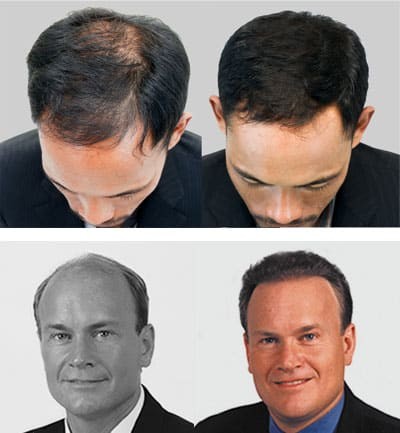Comparing Nutrafol and PRP Hair Loss Treatments
Hair loss is one of the most common concerns for men and women, affecting their confidence and self-image. As the search for effective treatments continues, a number of options have gained significant attention in recent years. Among them are Nutrafol and PRP hair therapy. Nutrafol, a nutraceutical supplement, and Platelet-Rich Plasma (PRP) therapy. In this blog post, we have gathered a consensus from around the web to compare Nutrifol with a more traditional clinical hair loss treatment regimen for balding men to compare outcomes and expectations. None of what we share here should be taken as "gospel" and you should ALWAYS consult your healthcare provider before trying any topical or clinical hair loss remedy or other solution.
What is Nutrafol?
Nutrafol is a dietary supplement designed to address various factors contributing to hair loss. It contains a blend of natural ingredients, including saw palmetto, ashwagandha, and marine collagen, among others. The product aims to target multiple root causes of hair thinning, such as stress, hormones, and nutrition.
Effectiveness for Balding Men
While Nutrafol was initially marketed primarily towards women, the company has since developed a formula specifically for men. But does it actually work for male pattern baldness?
Recent studies have shown expected results:
A 2018 study published in the Journal of Drugs in Dermatology found that men taking Nutrafol showed significant improvement in hair growth, with an increase in both hair count and thickness after six months of use.
Another study in 2021, focusing on perimenopausal, menopausal, and postmenopausal women, demonstrated positive results that could potentially translate to male users as well.
However, it’s important to note that individual results may vary, and Nutrafol may be more effective for some men than others, depending on the underlying causes of their hair loss.
Platelet-Rich Plasma (PRP) Treatment
PRP therapy is a medical procedure that involves drawing a patient’s blood, processing it to concentrate the platelets, and then injecting this platelet-rich plasma into the scalp. The theory behind PRP is that the growth factors in platelets can stimulate hair follicles and promote new hair growth.
Effectiveness for Balding Men
PRP has gained popularity in recent years as a clinical hair loss treatment. Here’s what research tells us about its effectiveness:
A 2019 systematic review and meta-analysis published in the Journal of Cosmetic Dermatology found that PRP therapy showed a significant increase in hair number and thickness compared to baseline for male androgenetic alopecia.
Another study in 2020, published in the International Journal of Women’s Dermatology, reported that PRP was effective in treating both male and female pattern hair loss (androgenetic alopecia), with improvements in hair density and quality.
Comparing Nutrafol and PRP
When considering Nutrafol versus PRP for hair loss treatment, several factors come into play:
Results
Nutrafol: Users typically report seeing results after 3-6 months of consistent use. Improvements may include reduced shedding, increased hair growth, and improved hair quality.
PRP: Results can often be seen within 3-6 months after treatment, with continued improvement over time. Some patients report seeing results as early as 2 months post-treatment.
Expectations
Nutrafol: As a supplement, Nutrafol works from within, addressing multiple factors contributing to hair loss. Users may expect gradual improvements over time, with continued use necessary to maintain results.
PRP: PRP is a more intensive treatment that directly targets the scalp. Patients might expect more dramatic results, especially in areas of thinning hair. However, multiple sessions are usually required, and maintenance treatments may be necessary.
Convenience
Nutrafol: Taken orally as a daily supplement, Nutrafol is non-invasive and can be easily incorporated into a daily routine.
PRP: Requires in-office procedures, typically spaced 4-6 weeks apart for initial treatments, with maintenance sessions every 4-6 months.
Cost
Nutrafol: Monthly subscription costs are relatively affordable compared to medical procedures, but long-term use is necessary.
PRP: Generally more expensive per session, with multiple sessions required. However, maintenance treatments may be less frequent than daily supplement use.
Side Effects
Nutrafol: Generally well-tolerated, with minimal reported side effects. Some users may experience mild digestive issues.
PRP: Minimal risk as it uses the patient’s own blood. Some patients report temporary scalp tenderness or mild swelling at injection sites.
Finding Your Own Hair Loss Solution
Both Nutrafol and PRP show promise in treating male pattern baldness, but they work in different ways and may be more suitable for different individuals. Nutrafol offers a holistic, non-invasive approach that addresses multiple factors contributing to hair loss, while PRP provides a more targeted, medical treatment directly to the scalp.
For men experiencing early stages of hair loss or those looking for a preventative measure, Nutrafol might be a good starting point. Its ease of use and lower initial cost make it an attractive option. However, for those with more advanced hair loss or those seeking potentially more dramatic results, PRP might be worth considering.
Ultimately, the choice between Nutrafol and PRP (or a combination of both) should be made in consultation with a qualified healthcare provider, dermatologist, trichologist or other hair restoration specialist who can assess individual needs and recommend the most appropriate treatment plan.
Consistency is key with any treatment regimen, and results may take several months to become noticeable. As with any hair loss treatment, managing expectations and understanding that results will vary from person to person is crucial.
Additional Reading:
https://www.ncbi.nlm.nih.gov/pmc/articles/PMC6609098/
https://www.ncbi.nlm.nih.gov/pmc/articles/PMC7144061/
https://www.instyle.com/i-tried-nutrafol-review-7569353
https://www.health.harvard.edu/blog/does-platelet-rich-plasma-for-the-scalp-help-grow-hair-202111292635
Medical Disclaimer: This blog post is for informational purposes only and does not constitute medical advice. Always consult with a qualified healthcare professional before starting any new treatment or supplement regimen. Individual results may vary, and what works for one person may not work for another. The information provided here is not intended to diagnose, treat, cure, or prevent any disease.

